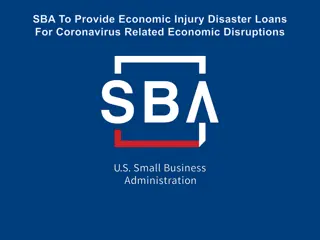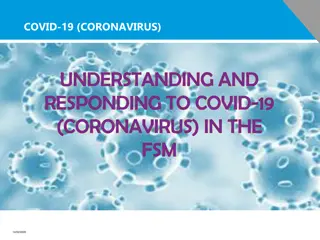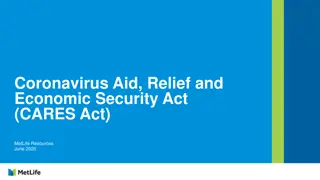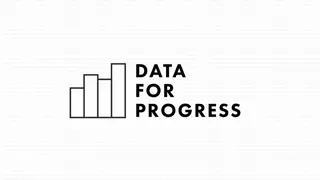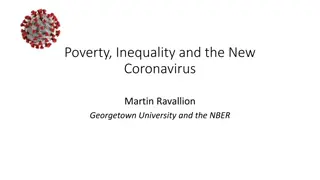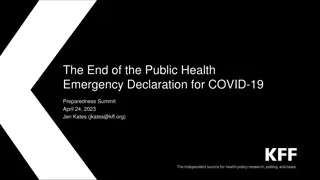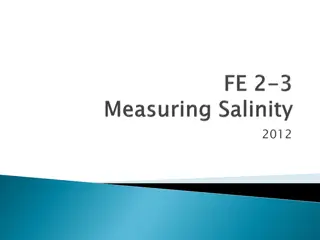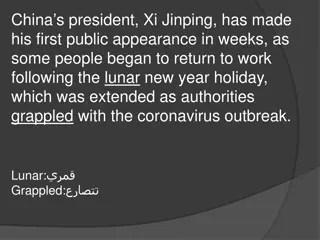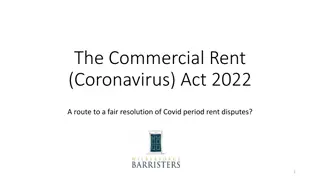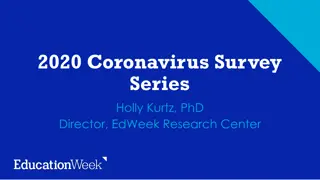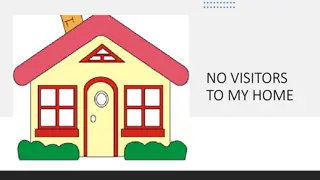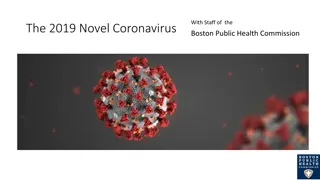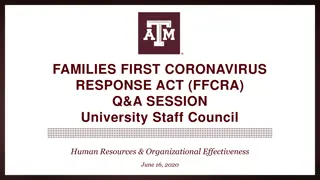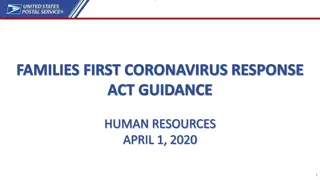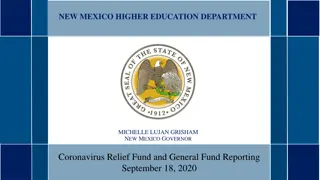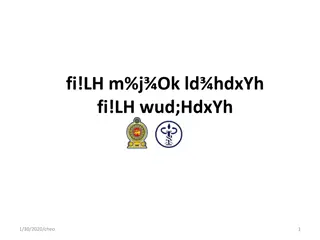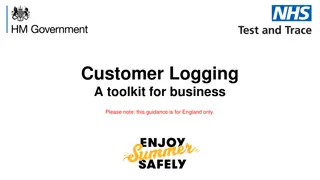Combatting Misinformation During the COVID-19 Pandemic
In times of crisis, such as the COVID-19 epidemic, it is crucial to critically evaluate information before believing and sharing it. This content highlights the importance of verifying sources, avoiding spreading unverified information, and staying informed through reliable sources. It also discusses a simulated conversation emphasizing the need to question and verify information instead of blindly believing it.
Download Presentation

Please find below an Image/Link to download the presentation.
The content on the website is provided AS IS for your information and personal use only. It may not be sold, licensed, or shared on other websites without obtaining consent from the author. Download presentation by click this link. If you encounter any issues during the download, it is possible that the publisher has removed the file from their server.
E N D
Presentation Transcript
L I B E R A L S T U D I E S X I N F O R M A T I O N L I T E R A C Y F O R S T U D E N T S CORONAVIRUS DISEASE 2019 (COVID-19) BE AN INFORMATION MASTER!
PREAMBLE DON T PANIC DURING THE EPIDEMIC As a student, you may / may not have actually experienced the time of SARS outbreak. The anxiety in the society and even panic caused by the emergence of COVID-19 in 2019 is due to people s inability to fully grasp the transmission, prevention and treatment methods of the epidemic. Therefore the related non-evidence based information is spreading at an alarming rate However, in times of crisis, we should embrace the scientific spirit of respect for evidence, use critical thinking skills, and find out the truth from multiple perspectives. We must think critically, share reliable and accurate information with others, and maintain personal and environmental hygiene. Together, we fight the virus!
(Please broadcast!) The security guard at XX Plaza urged everyone not to go there because many employees took sick leave due to a high fever. Thanks for sharing! I also received that recording! The epidemic is serious now, and it is better to believe it! Go to buy daily necessities. I heard that the imports from the Mainland are about to be suspended! Thanks! I'll go with my mom to buy daily necessities now! Ugh! Anyway, just buy as many as you can! (simulated conversation) HAVE YOU/ YOUR FRIENDS EVER HAD THE ABOVE CONVERSATION?
BASED ON THE ABOVE CONVERSATION, WHAT DO YOU THINK IS WORTH NOTING? (1) The source of the information is not clear, yet asking people to broadcast. For example, it can only point out that it is from the security guard at XX Plaza", but does not provide any web link to allow others to verify the source of the message. (2) Believe without checking the validity of the message received. (3) A misconception. An attitude of it is better to believe it will not help you to find out the truth. (simulated conversation)
THE TRUTH IS . . . (1) GOVERNMENT RELEASES A PRESS RELEASE "GOVERNMENT CONDEMNS RUMOUR MONGER" ON FEBRUARY 5, 2020 (2) PEOPLE INVOLVED WERE ARRESTED FOR USING RADIOTELEPHONE TO TRANSMIT FALSE INFORMATION Relevant News/Information "Government condemns rumour monger" on February 5, 2020 Retrieved from: https://www.info.gov.hk/gia/general/202002/05 /P2020020500797.htm Rumour monger arrested! Fake news on multiple employees having a fever in a mall on February 4, 2020 Retrieved from: https://twitter.com/hkpoliceforce/status/122463 1797134188544
When you receive any information, you should carefully consider the following questions: Who created the message? HOW CAN I ANALYZE THE AUTHENTICITY OF THE INFORMATION? Who forwarded the message to me? What should I do after receiving the message? What are the contents of the message, and how can I verify them? What will happen if I forward the unverified messages?
Q1: WHO CREATE THE MESSAGE? During a severe epidemic, it is difficult to find the author of the message, but if it is not from credible agencies or Government official information, we should always stay alert. Further reflection: Why did they create these messages? Who are they? What are their backgrounds? If the messages are widely believed, what benefits / harms will these messages bring and what impacts will they have on the society?
Q2: WHO FORWARDED THE MESSAGE TO ME? The person who forwarded the message may be your family, friends, or even seniors. They may forward the message out of love and care, but this does not mean that the message forwarded must be correct. Instead, we must verify the content of the message and inform the sender to correct the message in a timely manner. To be a responsible person, we should not forward any doubtful and incorrect message. Further reflection : Why did they forward these messages? Have they verified the authenticity of the message before forwarding it to me? If I do not agree with what they forwarded to me, how should I inform them to correct the message?
Q3: WHAT SHOULD I DO AFTER RECEIVING THE MESSAGE? When we receive any forwarded message, we should first stop and think , instead of rushing to forward the messages received. We should find out the key points of the message, analyse and verify it detailedly, and point out any unreasonable and illogical contents, respect for evidence and think critically.
Q4: WHAT ARE THE CONTENTS OF THE MESSAGE, AND HOW CAN I VERIFY THEM? Carefully analyse the contents of the message and try to identify any parts unreasonable. Verify the message by finding out authoritative, credible, and reliable websites, such as the Information Services Department, Centre for Health Protection of the Department of Health, and cite them: GovHK http://www.gov.hk/en/residents/ Centre for Health Protection of the Department of Health https://www.chp.gov.hk/en/index.html Census and Statistics Department http://www.censtatd.gov.hk/home/index_tc.jsp
Q5: WHAT WILL HAPPENS IF I FORWARD UNVERIFIED MESSAGES? We are responsible for our own words. If the unverified message is forwarded, the negative consequences may not appear immediately, but with the impact of conformity, some people will eventually hoard the goods, resulting in insufficient supply, and those who are really in need may not be able to obtain the resources in time.
WHAT SHOULD YOU DO IF YOU RECEIVE THIS MESSAGE AGAIN? [THINK OF YOUR OWN ANSWER] (Please broadcast!) The security guard at XX Plaza urged everyone not to go there because many employees took sick leave due to a high fever. Friend A (What should I reply ) Me The epidemic is serious now, and I d better believe it! (What should I reply ) Friend A Me
WHAT SHOULD YOU DO IF YOU RECEIVE THIS MESSAGE AGAIN? [SUGGESTED ANSWER] (Please broadcast!) The security guard at XX Plaza urged everyone not to go there because many employees took sick leave due to a high fever. Thank you! Where did the information come from? Is it reliable? If it spreads without confirmation, it may cause social panic! Friend A Me The epidemic is serious now, and I d better believe it! Just because the epidemic is serious, we need to face it and discuss it rationally. Take care of yourself! Friend A Me You too Take care, my friend! Friend A Me
CONCLUSION TOGETHER! WE FIGHT THE VIRUS The epidemic is severe, what students can do is Refuse to be the creator and disseminator of unconfirmed information, analyse the authenticity of information rationally, adopt a stop and think approach, avoid increasing the burden on other sectors caused by panic created; Avoid believing and reacting to unverified information such as hoarding daily necessities, masks, etc. so that patients and healthcare staff who are really in need are able to purchase such materials; Based on evidence and information obtained from reliable websites, share proven, useful and correct information with family and friends around you; Hold a positive and optimistic attitude to prevent and fight the epidemic, pay attention to personal and environmental hygiene, take more exercise, and make good use of your time at home to equip yourself; Love your neighbour as yourself, help each other, care more about the people around you, and encourage each other during times of adversity!


